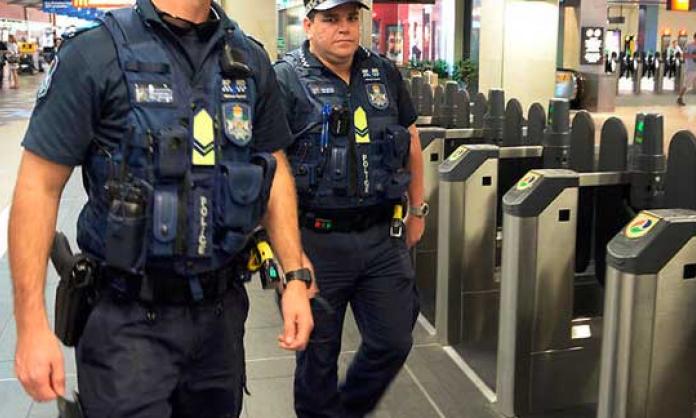In the wake of the Sydney siege a law and order campaign with broad support is well under way, some of it in the guise of concern about violence against women.
Man Haron Monis was on bail when he took hostages in the Lindt café in Martin Place. That fact prompted a reporter at the press conference immediately after the siege to ask NSW premier Mike Baird, “How was this gunman free on bail?” The ABC’s Chris Uhlmann taxed Abbott with the same question. The Daily Mail (Australia) on the day of the siege led with it.
A variety of other voices also joined this chorus. Two days after the siege the Guardian’s Melissa Davey wrote an article titled “Man Haron Monis ‘would not have been on bail if domestic violence was taken as seriously as terrorism’”. Feminist commentator Clementine Ford bemoaned “our country’s lax approach to probation and bail laws”.
Let’s be clear: bail rights being further reduced will mean more poor and vulnerable people being kept in increasingly cramped and inhuman conditions. It will not do anything to prevent domestic violence. It will increase the level of state violence, which already disproportionately injures Aboriginal people, for whom any time in custody is a potential death sentence.
You can lay down as many caveats as you like about only applying tighter bail conditions to certain offenders. But all it does is give further legitimacy to the repressive arm of the state. Giving cops and the courts more powers to deny people bail is no different to strengthening any other powers of the state, whether it’s surveillance of our metadata or longer sentences.
Such is the support for the law and order agenda, even on the broader left, that it took a former adviser to the Howard Liberal government to mount a case against the anti-bail chorus. Lawyer Greg Barns’s 17 December Drum article “Stricter bail laws would be an assault on our rights” was better than virtually anything else in standing against the law and order frenzy.
Detaining someone who has not been found guilty is a very serious incursion on liberty. “Unfortunately”, Barns wrote, “and due to the unseemly coalition of police, victims’ groups and tabloid media outlets, in the past couple of decades legislators have whittled away that presumption of innocence and right to liberty by making it very difficult for individuals to get bail.”
This is precisely the dynamic that is ignored when the focus is placed on individual acts. For a series of offences there is now a presumption against bail. People who are found innocent at trial will have spent months or years in prison despite not having committed any crime.
Barns draws attention to a change.org petition, later removed, which called for “stronger bail laws that would have kept this dangerous man behind bars right now”. In a very enlightening post on the petition site, its originator, Sarah Langston, explained why she decided to shut down the petition.
Her concerns, which unfortunately will reach far fewer than the enraged 108,000 who signed in its two-day existence, are worth reiterating: “If new bail laws are pushed through in response to this petition, the damaging effects on our community may be profound and for some lives, permanent”.
It is already the case that bail conditions, particularly the posting of large amounts of money (tens or even hundreds of thousands of dollars), deny freedom to the poor. Indigenous people, especially women, are more likely to be affected due to systemic and institutional racism – poverty and inability to post bail, lack of services including legal representation, and judges’ perceptions that they are less likely to turn up to court. Indigenous women already face higher rates of remand despite their offences being mostly property- or drug-related.
Complaints that current bail laws make it too easy for people to be released simply play into a reactionary agenda that seeks to trample on civil liberties more generally. Already, despite the overall crime rate going down, police powers to arrest more people on minor charges and to keep them in prison for longer have been increased.
There has been a nationwide strengthening of sentencing laws, much of it justified with reference to concerns about rape (the high profile case of Jill Meagher in Melbourne) or street violence (the high profile case of Thomas Kelly in Sydney). In Victoria, this has resulted in the prisoner population increasing 14 percent over the last year.
This year, cuts have been announced to a range of the services that can increase women’s ability to escape domestic violence – from assistance to low-income households to public housing to women’s refuges and homeless shelters. The law and order campaign overshadows this. For example, the Mid-Year Economic and Fiscal Outlook, released as the Martin Place siege was unfolding, significantly increased resources to security agencies. There has been not a word written about how that money could be redirected to decent public housing for at-risk women and children.
The actions of Man Haron Monis, and popular revulsion against them, have provided another welcome opportunity for our rulers to attack a whole series of rights on the sole basis that Monis had these rights.
For example, Tony Abbott was infuriated that legal aid resources were available to Monis, or that anyone is “entitled to go to the law with taxpayer funding when … they are essentially attacking the policy of the elected government”. It is worth remembering that in March the government scrapped legal aid funding for asylum seekers who wanted to challenge the government’s refusal to grant them protection.
On 19 December the Daily Telegraph explained to us the ten “fatal failures that led to a horrific day”. Every one of them is about Monis’s civil liberties not being trampled on enough – not just that he was granted bail but that he was allowed into the country at all, that he was not extradited to Iran on the say-so of the authoritarian Iranian government, that he was granted citizenship, that he was given legal aid, that he had access to welfare payments. Let only a fool think that the Daily Telegraph wants access to these things denied only to terrorists.
Within a few days the NSW director of public prosecutions had been directed to conduct a review of all current bail decisions. Further reactionary changes are going to come into effect on 28 January.
There is a point that left wing commentator Russell Brand made about the siege: “I’m not saying there aren’t a lot of dangerous people out there, I’m saying a lot of those people are in government”.
Spot on. Let’s not give our government and their police forces any more powers.









